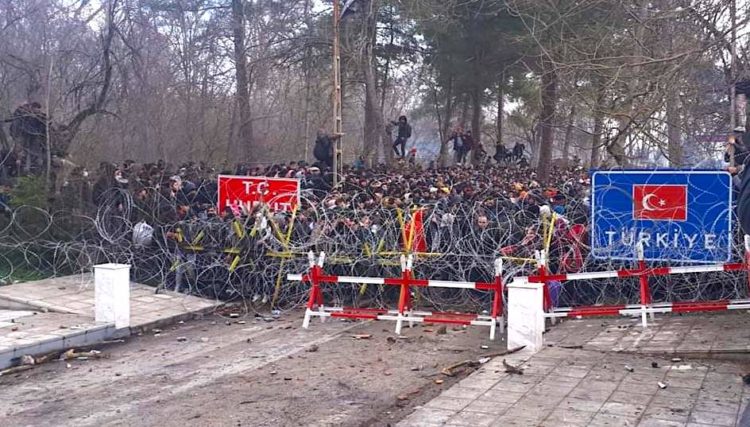The situation on the border between Turkey and Greece is rapidly escalating out of control, as migrants attempting to reach a new home and safe haven in Europe have engaged in violent clashes with riot police. It has been reported that a small army of around 1,000 Greek police, including special operations officers, has been deployed to the border region, and they have been accused of using live ammunition and of killing at least three migrants by the Turkish government. However, there is no evidence to support these claims and they are strongly denied by the government in Athens. It was estimated that between 1st March and 5th March alone 35,000 migrants were prevented from crossing, and they have been deporting any who have been found to have made it across the border.

It seems like the clashes will only get worse, as Turkey’s government has claimed up to 76,000 more migrants are on their way. The mass migration itself is a result of the decision by Turkey’s controversial president Recep Tayyip Erdogan to open Turkey’s side of the border, encouraging the movement of tens of thousands of hopeful people, the majority of whom allegedly have come from Afghanistan but also significant numbers claiming to be from Syrian.
The motive of the Syrian refugees is of course to escape the ongoing war in their home country, which on Sunday 15th March will mark its bloody nine year anniversary. It is important to note that Turkish intervention has also further escalated the conflict since October. Turkish troops are continuing their invasion of north-eastern Syria and have clashed with both Kurdish forces – who have been fighting against Al-Assad and Islamic extremist groups – and more worryingly with Russian-backed President al-Assad’s forces. One air strike by Syria forces recently killed 33 Turkish soldiers last week, an event which could lead to further escalation and possibly all out war between the two governments.
Erdogan has two primary motives for opening the Greek border. The first is that Turkey is already home to around four million Syrian refugees, many of whom are becoming settled and accustomed to their new home in Turkey. The escalation of conflict in Syria will likely result in another exodus of civilians desperate to escape the violence, many of whom will head to Turkey as the easiest destination. The fact that much of the fighting between Turkish and Kurdish forces is around the border regions as a result of Erdogan’s invasion makes this even more likely. As a result, Erdogan is likely keen to make sure even more refugees don’t settle in Turkey and hopefully encourage some of the four million already in his country to move on to Europe as well.

Secondly, Turkey has become caught up in a tricky international situation. Russia is one of Turkey’s primary defence suppliers, but is also the key supporter of the al-Assad regime Erdogan is fighting in Syria. This has left Erdogan, whose government has faced accusations of increased authoritarianism and corruption, in need of new supporters. As a result he has been attempting to gain support from the 27 European Union countries to support his military campaign. However, no EU member has agreed to do so, and so Turkey claimed that they have been “forced to open the doors” as a result of the lack of support they have received from the EU.
It could be argued that Erdogan is attempting to use the refugee crisis to hold Europe hostage in order to gain support for his military operations in Syria. However, if this is the case it has been extremely unsuccessful. When speaking to Erdogan personally, European council president Charles Michel stated that, “the EU is actively engaged to uphold the EU-Treaty statement to support Greece and Bulgaria to protect the EU’s external borders.” Europe has made it clear that it expects Turkey to comply with a deal struck in 2016, in which Turkey agreed to halt the flow of refugees in exchange for billions of euros in funding, and European commission president Urusla von der Leyen has gone as far as describing Greece as a “European aspida”, meaning “shield.” As well as this verbal support, the EU has pledged 700 million euros in aid to Greece, of which 350 million is specifically intended to upgrade infrastructure on the border with Turkey. If Erdogan is hoping to gain EU support for his operations in Syria through the political use of refugees, he will be facing a much tougher fight then he may have anticipated.
Overall, it is understandable why Greece and the EU as a whole does not want to accept these refugees. The issue of immigration has been a highly contentious one in European politics over the past few years, and European leaders do not want to ignite further tensions in their own countries. Greece is still struggling with the aftermath of years of economic woes, and a sudden influx of refugees, especially given the current spread of the COVID-19 virus, will only have further negative consequences for their country. However, it is of course important to remember the dire situation of the tens of thousands of people, many of whom are families with children, who are attempting to cross the border into Europe in hopes of a new and better life.
Image: A crowd gathered at the border, prevented from crossing. (Credit: Greek Reporter / Foto Hobby Orestiada)

